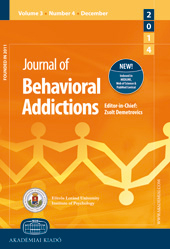Gambling, motor cautiousness, and choice impulsivity: An experimental study
Gambling, motor cautiousness, and choice impulsivity: An experimental study
Author(s): Andrew Harris, Daria J. Kuss, Mark D. GriffithsSubject(s): Behaviorism
Published by: Akadémiai Kiadó
Keywords: executive control; gambling; impulsivity; harm minimization; motor cautiousness
Summary/Abstract: Impulsivity is currently more commonly regarded as multifaceted, comprising both motor and cognitive subdomains. However, it is less clear how distinct these subdomains are, and the extent to which they interact and draw upon the same psychological resources. Methods. The present experiment comprised 70 regular (non-problem) gamblers, and investigated the potential to induce impulsivity transfer effects within an electronic gambling context. Original and existing harm-minimization approaches were tested for their efficacy in inducing motor cautiousness during an electronic slot machine simulation. Participants were exposed to a forced discriminatory motor choice procedure, or pop-up responsible gambling messages that either contained emotive or non-emotive responsible gambling content. The subsequent impact these interventions had on delay discounting and reflection impulsivity was also measured using the 27-item Monetary Choice Questionnaire and Information Sampling Task, respectively. Results. Findings demonstrated that only original harm-minimization approaches, which force the gambler to engage in discriminatory motor choice procedures during gambling, were successful in inducing motor cautiousness. However, both the discriminatory choice procedure and emotive message harm-minimization approaches were successful in facilitating cognitive choice, even though the emotive message intervention was unsuccessful in facilitating motor response inhibition, suggesting both an indirect motor cautiousness route, and a more direct route to improved cognitive choice during gambling. Conclusion. This study demonstrated that decision-making during gambling can be improved by making simple structural changes to slot machine platforms, by encouraging active engagement in motor processes, which result in a transfer of cautiousness to wider cognitive domains.
Journal: Journal of Behavioral Addictions
- Issue Year: 7/2018
- Issue No: 4
- Page Range: 1030-1043
- Page Count: 14
- Language: English

